Indian media: Is banning Delhi rape film right?
- Published
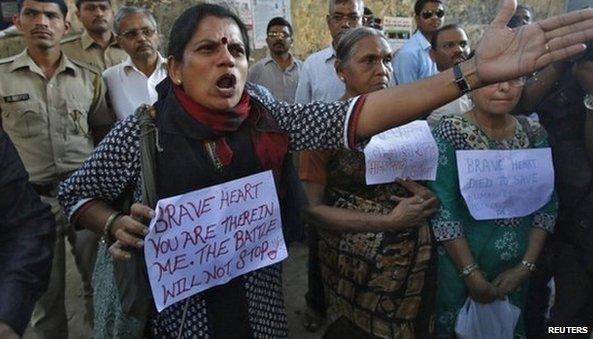
The Delhi gang rape and murder sparked widespread protests across the country in 2012
The BBC's film about the 2012 Delhi gang rape and murder case continues to dominate media debate in India.
Film maker Leslee Udwin's interview with the convict appears in India's Daughter, a BBC Storyville documentary which was broadcast in the UK on Wednesday.
It was also due to be shown in India on NDTV. But police secured a court injunction late on Tuesday, blocking the broadcast in India.
A section of the media have taken "strong objection" with the content of the film.
Rapist Mukesh Singh, who along with the three others is facing the death penalty, expressed no remorse in the interview with Ms Udwin, and blamed the victim for fighting back.
"This is journalism turned upside down. This is unethical," said prominent TV journalist Arnab Goswami on his show on Tuesday night, and continued to raise questions over the film on Wednesday as well.
Home Minister Rajnath Singh also criticised the film in parliament, saying it should not be shown in India.
The Zee News TV seems to agree with Mr Singh, the channel's headline on Wednesday reads: "India won't take Nirbhaya's (The Fearless One) insult".
Nirbhaya is one of the nicknames given to the victim, who cannot be named for legal reasons, by the media in India.
'Don't shoot the messenger'
But beyond these strong headlines, some of India's prominent newspapers and writers have raised questions over the government's decision to block the film in India.
The Times of India, external, which is part of the media group that also owns Times Now, says "the real scandal here is not who permitted such an interview, but how disturbingly common such a point of view - which utterly devalues women - is across social classes in India".
The paper says the convict's views are not uncommon.
"Politicians of all hues, even police chiefs and women's commission members have been heard to suggest that women themselves are somehow responsible for being raped," it says.
The paper urges the government to take notice of the views, though in minority, raised by MPs Javed Akhtar and Anu Aga.
Speaking in parliament, Mr Akhtar welcomed the making of the film and said it would reveal how rapists think.
"Simply shoving them [views of Mr Akhtar and Ms Aga] under the carpet and pretending they don't exist provides ideal conditions for them to fester and grow, provoking more crimes in future," it adds.
The paper also feels that the ban is not likely to work because "the writ of the Indian government doesn't run across the world or the internet - viewers can't be stopped from choosing to watch Udwin's film".
'Misdirected ire'
Papers like The Times of India and Hindustan Times appear to be supporting the film on Wednesday, in contrast with the government and other political parties' stand.
The Hindustan Times, external says the film highlights the "regressive mindset" of some men in India and it needs to be debated.
The paper says "banning the documentary is to take the easy way out. The problem it addresses will not go away quite so easily".
"Instead of trying to suppress the film in which a convict has aired his despicable views, the ministry need to strengthen our policing system so that women have a fighting chance to prosecute their attackers," it adds.
The government, the Delhi police and political parties were quick to dismiss the film on Wednesday, and some of them termed it "anti-women" and "anti-India".
'Nanny state'
But papers like The Indian Express believe that the anger seems to be misdirected.
"Whatever the procedural lapse, if any, or indeed whatever the sensibilities of the documentary-maker, the government's response speaks of a terribly misdirected ire and an extraordinarily thin skin," it says in an editorial.
The papers seems to agree with the thought that the convict's views about women are not an individual's thoughts.
"While the convicted rapist flaunts a particularly savage form of misogyny, it is not his preserve alone — too many public figures have shown a proclivity to blame the victim. These realities are what actually damage India's image in the eyes of the world," it says.
Senior columnist Ashok Malik, in his NDTV column, argues that the decision to interview the convict "is a subjective call".
"The choice of interviewing a disreputable, downright evil subject and placing his words and actions in an appropriate context is that of the journalist or film-maker," he writes.
He writes that "those who suggest India's reputation and tourism potential will be damaged by the film make no sense".
"Indian authorities cannot possibly stop release of the film in other countries. As for Indians themselves, let them watch the film - or not watch it, if they so want - and think for themselves. They don't need the nanny state," he writes.
Social media discussion
The world of social media has also been active with all shades of opinions on the film.
The reaction on social media seems to be divided, with supporting the ban, while others strongly arguing in favour of the film.
Hashtags like #IndiasDaughter, #justiceforNirbhaya, #NirbhayaInsulted, and #banBBC have been trending since Tuesday.
Most people who have used the hashtag #Indiasdaughter support the film.

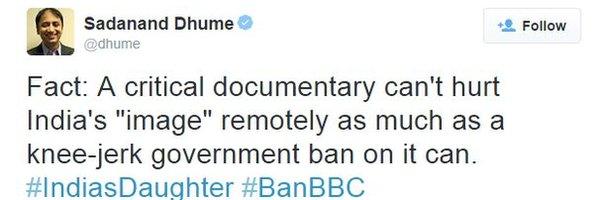

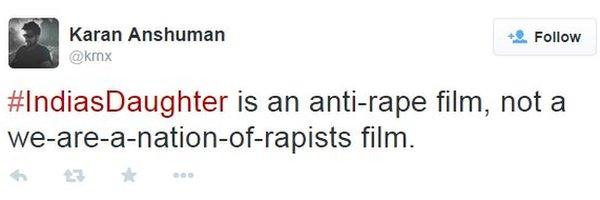

And most of those who have used the hashtag #NirbhayaInsulted have criticised the film.

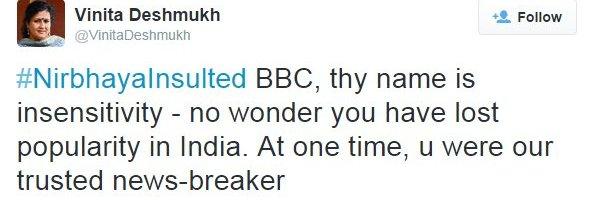

The #banBBC hashtag is being used to both support and criticise the BBC.

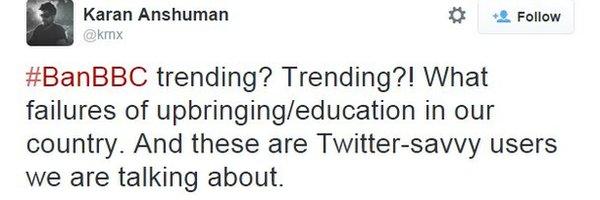

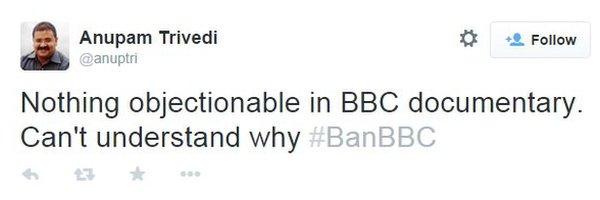

BBC Monitoring, external reports and analyses news from TV, radio, web and print media around the world. You can follow BBC Monitoring on Twitter , externaland Facebook, external.